Lesson (What is Important) and Activity -翻译
- 格式:docx
- 大小:17.34 KB
- 文档页数:3
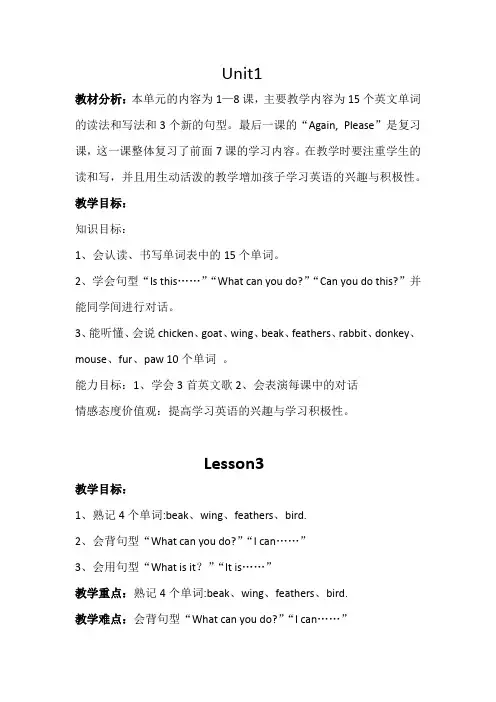
Unit1教材分析:本单元的内容为1—8课,主要教学内容为15个英文单词的读法和写法和3个新的句型。
最后一课的“Again, Please”是复习课,这一课整体复习了前面7课的学习内容。
在教学时要注重学生的读和写,并且用生动活泼的教学增加孩子学习英语的兴趣与积极性。
教学目标:知识目标:1、会认读、书写单词表中的15个单词。
2、学会句型“Is this……”“What can you do?”“Can you do this?”并能同学间进行对话。
3、能听懂、会说chicken、goat、wing、beak、feathers、rabbit、donkey、mouse、fur、paw 10个单词。
能力目标:1、学会3首英文歌2、会表演每课中的对话情感态度价值观:提高学习英语的兴趣与学习积极性。
Lesson3教学目标:1、熟记4个单词:beak、wing、feathers、bird.2、会背句型“What can you do?”“I can……”3、会用句型“What is it?”“It is……”教学重点:熟记4个单词:beak、wing、feathers、bird.教学难点:会背句型“What can you do?”“I can……”教具:录音机教学过程:一、复习导入1、复习提问第1课与第2课中单词的读法与意思2、导入在前面两课中我们学过了两种鸟类,是什么呢?那你们还知道其他的鸟类吗?这节课我们就来学习“鸟”用英语怎么说。
二、新课1、第一部分“What is it?”(1)讲解单词bird的意思及读法(2)讲解单词beak、wing、feathers的意思及读法(3)学生自由记、读四个单词(4)检查学生四个单词的读与记,并及时纠正学生不对的读法(5)学生独立完成对话“What is it?”“It is……”并写在纸上(6)全班集体交流2、第二部分“What can you do?”(1)讲解句子“What can you do?”的意思及读法。
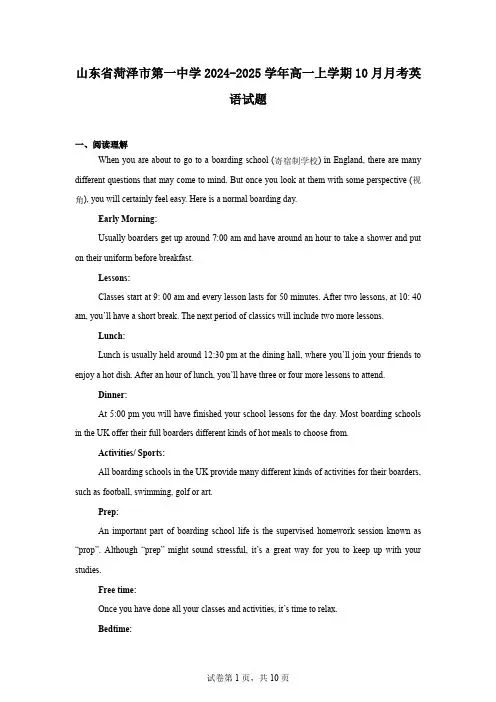
山东省菏泽市第一中学2024-2025学年高一上学期10月月考英语试题一、阅读理解When you are about to go to a boarding school (寄宿制学校) in England, there are many different questions that may come to mind. But once you look at them with some perspective (视角), you will certainly feel easy. Here is a normal boarding day.Early Morning:Usually boarders get up around 7:00 am and have around an hour to take a shower and put on their uniform before breakfast.Lessons:Classes start at 9: 00 am and every lesson lasts for 50 minutes. After two lessons, at 10: 40 am, you’ll have a short break. The next period of classics will include two more lessons.Lunch:Lunch is usually held around 12:30 pm at the dining hall, where you’ll join your friends to enjoy a hot dish. After an hour of lunch, you’ll have three or four more lessons to attend.Dinner:At 5:00 pm you will have finished your school lessons for the day. Most boarding schools in the UK offer their full boarders different kinds of hot meals to choose from.Activities/ Sports:All boarding schools in the UK provide many different kinds of activities for their boarders, such as football, swimming, golf or art.Prep:An important part of boarding school life is the supervised homework session known as “prop”. Although “prep” might sound stressful, it’s a great way for you to keep up with your studies.Free time:Once you have done all your classes and activities, it’s time to relax.Bedtime:In most boarding schools, the lights go out around 10:30 pm.Being nervous just before you go to a boarding school is completely normal and understandable. Hopefully, knowing the usual routine (常规) can help you. Once you are there, you will also see how exciting life in a boarding school in England can be.1.What can help you keep up with your studies in the boarding school?A.Doing activitıes.B.Having lessons.C.Enjoying free time.D.Supervised homework sessions.2.What do we know about boarding schools in England from the text?A.Classes usually start at 8:30 am.B.Students can have a short break after four lessons.C.They don’t give students any free time.D.They turn off the lights around 10:30 pm. 3.What is the purpose of the text?A.To help students know about boarders’ life.B.To attract more students to boarding schools.C.To introduce a new school life.D.To advertise for boarding schools.I want to share with you a story from 28 years ago. My dad was a used car salesman. Every Thursday night, he would head off to Shreveport, LA for an auction (拍卖会). Most of the time, I drove a car over there for him so he could sell it at the auction.One day I was riding with my dad when he noticed a hitch-hiker (搭便车的人) with a backpack. Without hesitation, he pulled the car over and offered him a ride. Dad asked him his name, and proceeded to talk to him about all sorts of things. Dad asked him where he was going. The hitch-hiker told him that he was heading for the west. I can’t recall why but he told Dad a lot of things that had occurred to him and that persuaded him to make that decision. He talked about the tragic events that occurred to him several years before. He was in low spirits, but I could see that the hitch-hiker’s attitude was changing as someone was really listening to him.We drove 45 minutes before the hitch-hiker got off. We pulled over and Dad told him to keep his head up and things would start looking up for him soon. He reached into his pocket and handed the hitch- hiker a twenty-dollar bill. The guy smiled. He nearly lit up right there on the cold, dark highway.We drove on and my dad did not say a single thing. I was still completely surprised by what I had just witnessed. I was always told by everyone never to pick up a hitch-hiker and yet my dad did it every single time he saw one. While reflecting upon that story I came to understand that just one single kind act could change someone’s life. And I am sure that my father’s deed made that poor man’s day.4.What made the hitch-hiker become less upset?A.The writer’s father talking to him about all sorts of things.B.The writer’s father offering him a free ride.C.The writer’s father really listening to him.D.The writer’s father agreeing to drive him to his destination.5.When his father helped the hitch-hiker, the writer ___________.A.was deeply moved B.strongly disagreedC.admired his father D.couldn’t understand6.Which of the following words can be used to describe the father?A.Wealthy.B.Warm-hearted.C.Far-sighted.D.Adventurous.7.What’s the writer’s main purpose of writing this text?A.To tell a story of his father.B.To show his respect for his father.C.To prove his father is the best teacher.D.To advise people to learn from the hitch-hiker.What you do after studying could have a big effect on how well you learn and remember. Today on Education Tips, we will explore two no-cost ways that can help you improve your learning: wakeful rest and sleep.When many students finish studying, they often go straight to another activity. Perhaps they look at their phone or computer. They might even play a video game or watch television. But research suggests that resting after your study may help you remember what you have studied.The basic idea is this: by stopping your activity after the study, your brain gets a chance to rest. Resting is difficult when you are playing computer games.While this might sound unusual to you, many studies have explored the benefits of resting after learning—what is called “wakeful rest”.A 2019 study found that both young and older adults were able to better remember information they learned after doing wakeful rest.If you want to give “wakeful rest” a try, here are a few simple things to do. Rest quietly for five to ten minutes. Do not look at your phone, read stories or play games. It is really that easy!Besides wakeful rest, sleep is also important for learning. The Division of Sleep Medicine at Harvard Medical School (HMS) notes that sleep helps people to learn in two ways. A report on the school’s website explains that “a sleep-deprived person cannot focus attention well and therefore cannot learn well”. It also says, “Sleep itself helps us to memorize and that memorizing is very important for learning new information.”The National Sleep Foundation (NSF) suggests that adults between the ages of 20 and 64 get between 7 and 9 hours of sleep per day. Teenagers may need a little bit more, and people over the age of 65 may need a little less.Try to get some “wakeful rest” after a study. Then try to get a good night’s sleep. That’s it—a simple, no-cost way to help you remember what you learn.8.What is paragraph 3 mainly about?A.The importance of sleep.B.The good ways to get a rest.C.The reason for having a rest.D.The types of resting activities.9.Which activity might be recommended shortly after studying?A.Reading a newspaper.B.Playing a video game.C.Sitting there doing nothing.D.Having a nice sleep at night.10.How long should teenagers sleep each day according to NSF?A.Less than 7 hours.B.Just 7 hours.C.No more than 9 hours.D.Around 9 hours.11.What can be a suitable title for the text?A.Low-cost Tips on Working B.Good Things to Do After Your StudyC.Why Do We Need to Have a Good Sleep?D.How Long Should We Rest AfterLearning?Exams are brain-burning. The silence of the hall; the beating of the clock; the watchful eye of the teacher; the proud expression of the person who has finished 15 minutes early. So it is not surprising that those who feel anxious in the exam do worse than those who do not. But different from the existing(现存的) point of view, the recent study by Maria Theobald shows that the pressure of revision affects(影响) your exam performance.To test this idea, Dr Theobald worked with 309 German students who were preparing for their final exam. During the 100 days before the real exam, these students used an online learning app which showed them old exam questions and recorded their performance. And 40 days before the real exam, they also took a mock(模拟) exam. Their levels of anxiety were also be recorded and assessed(评定), every day for 40 days before the real exam and also on the day of that exam.The result was not what she expected. Anxiety on the day of the test did not predict(预测) exam performance at all. It was the level of knowledge in the mock exam and the earlier practices that predicted it. Those who performed well in the mock exams also did well in the real test, no matter how anxious they were on the day.It turned out that what really affected students were high levels of anxiety during the weeks before the exam. The greater a student’s anxiety in the days before the exam, the lower his or her knowledge gain was. To reduce this anxiety, she gives some advice for students when they revise. First, they can raise their confidence in their own abilities by reminding(提醒) themselves of how much they know. Second, they can diminish the importance of the test by reminding themselves that, though it is important, it is not a life or death situation. It really isn’t.12.What influences exam results according to the existing view?A.Exam levels.B.Exam schedule.C.Pressure from the exam hall.D.High expectations(期望) from teachers. 13.How did Dr Theobald go on the study?A.By asking students some questions.B.By collecting the data(数据).C.By asking experts` advice.D.By following students’ performances. 14.What does the underlined word “diminish” probably mean in the last paragraph?A.Reduce.B.Influence.C.Realize.D.Understand. 15.Which of the following is the suitable title for the text?A.Never Too Late to Revise B.Never Put Off Revision till TomorrowC.Anxiety in Revision, Failure in Exam D.The More Pressure, The Better ResultsPeer PressurePeer pressure is a part of life. 16 This peer group may be of similar age but can also be defined by other commonalities (共同点), including motherhood, professional affiliations, and your local neighborhood.Peer pressure is not always negative. Trying to fit into a healthy social group, for example, of peers getting good grades, joining sports teams, and making plans for their futures, is positive.17 Peer influence can show you there is support, encouragement, and community available to you. By seeing someone else do something positive, you may reflect on your own life choices, goals, and where you spend your time.18 Being pressured by peer, whether it happens in person or online, may shake your sense of identity and self-confidence. For example, you may feel pressure to do unsafe things that have risks you may not fully know.19 You can also work on surrounding yourself with more positive influences. Some ways of coping with peer pressure include:● Not spending time with people who pressure you to do things that feel wrong or dangerous.● Learning to say “no” and practicing leaving situations that feel unsafe or uncomfortable.● Talking to a trusted peer or professional (teacher, counselor) if you have problems saying “no” or are feeling pressured to change something about yourself.● 20In the journey of life, peers influence our steps. If you embrace positive guidance and stand firm against negativity, you can become the architects of your own story.A.Some refer to this type of peer “pressure” as peer “influence”.B.It can be direct or indirect, positive or negative.C.It is any type of influence that comes from a peer group.D.Getting over peer pressure means not accepting the negative influence of others.E.While peer influence can improve your life, peer pressure can cause problems.F.Feeling pressured to do things that may make you feel bad about yourself is unhealthy.G.Befriending people who have a positive influence.二、完形填空Jenna had graduated from middle school and was ready for new 21 in high school.22 , high school was different. In the first week, Jenna tried out for a cheerleading team. She 23 very excellent girls, and she knew it would be difficult for her to be chosen. Two hours later, the judge(裁判)24 a list of the girls for the second try-out. Her name wasn’t on the list. Feeling 25 , she walked home carrying her schoolbag full of homework.26 home, she started with math. She had always been a good math student, but now she was 27 . She moved on to English and history, and was 28 to find that she didn’t have any trouble with those subjects. Feeling better, she decided not to 29 math for the time being.The next day in30 class, Jenna spent most of her time working out the problems that had given her so much 31 . By the end of class, she finally got the answers. As she gathered (收拢)her books, Jenna 32 she’d continue to try to fit in at her new school. She wasn’t sure if she’d succeed, but she knew she had to 33 . High school was just as her mom had said, "You will feel like a small fish in a big pond 34 a big fish in a small pond. The challenge is to become the 35 fish you can be."21.A.courses B.decisions C.challenges D.exercises 22.A.So B.However C.Therefore D.Besides 23.A.fought B.connected C.beat D.encouraged 24.A.pronounced B.forgot C.saw D.heard 25.A.strange B.happy C.sad D.lonely 26.A.Arriving B.Going C.Staying D.Leaving 27.A.struggling B.improving C.working D.continuing 28.A.anxious B.disappointed C.scared D.relaxed 29.A.work with B.prepare for C.worry about D.give up 30.A.physics B.history C.English D.math 31.A.pleasure B.hope C.trouble D.courage 32.A.decided B.accepted C.refused D.felt33.A.swim B.try C.ask D.travel34.A.in exchange for B.in case of C.in terms ofD.instead of35.A.thinnest B.smallest C.best D.gentlest三、语法填空阅读下面短文,在空白处填入1个适当的单词或括号内单词的正确形式。
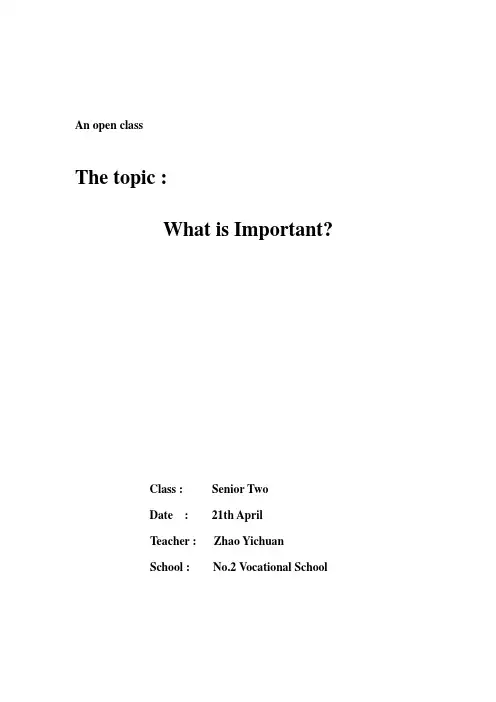
An open classThe topic :What is Important?Class : Senior TwoDate : 21th AprilTeacher : Zhao YichuanSchool : No.2 Vocational SchoolUnit 6 What is Important ? Teaching Aims and Demands :1, To master some key words and expressions.2, To understand the passage.3, To finish the exercises about the passage.4, To develop the students’ habits of awareness of teaching themselves and team work and exploring study.5, Let the students understand “ Money is not everything”. Teaching Difficult and Important Points:1, To grasp the key words and expressions.2, To discuss the question:Is money so important?Teaching Steps:Step 1 Warming UpShow the students several pictures on page 50 .Ask them the following questions :1, Do you think money is important?2, Do you like to wear famous brand clothes?3, What do you think of life, easy or difficult?Then let the Ss discuss these questions together.Step 2 Fast ReadingGive the Ss 4-5 minutes to read the passage quickly.And then ask them to finish the exercises about the passage. Let the Ss answer these questions one by one.And check the answers with the Ss.Step 3 Words and Expressions1, Introduce the new words and expressions in Unit 6.2, Explain some important words and expressions.Step 4 Reading carefully1, Let the Ss to read the passage carefully.2, Deal with some language points.1) earn one’s living2) remind sb. of sth.3) unless4) instead of5) show off6) be different from7) at the same time8) afford9) be proud of10) on earthStep 5 PracticeDo the exercises Language Study. Check the answers.HomeworkFinish off the exercises on WB. The blackboard design。
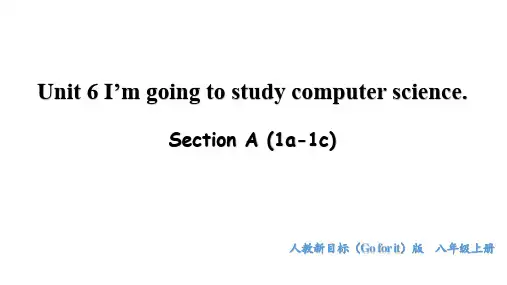
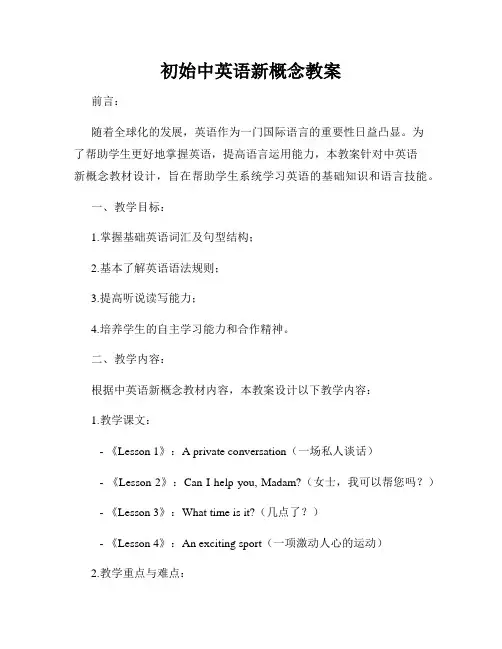
初始中英语新概念教案前言:随着全球化的发展,英语作为一门国际语言的重要性日益凸显。
为了帮助学生更好地掌握英语,提高语言运用能力,本教案针对中英语新概念教材设计,旨在帮助学生系统学习英语的基础知识和语言技能。
一、教学目标:1.掌握基础英语词汇及句型结构;2.基本了解英语语法规则;3.提高听说读写能力;4.培养学生的自主学习能力和合作精神。
二、教学内容:根据中英语新概念教材内容,本教案设计以下教学内容:1.教学课文:- 《Lesson 1》:A private conversation(一场私人谈话)- 《Lesson 2》:Can I help you, Madam?(女士,我可以帮您吗?) - 《Lesson 3》:What time is it?(几点了?)- 《Lesson 4》:An exciting sport(一项激动人心的运动)2.教学重点与难点:- 英语基础词汇与语法的掌握;- 听力与口语的训练;- 阅读与写作技巧的培养。
3.教学方法:- 情景教学法:通过模拟真实场景,激发学生的学习兴趣;- 合作学习法:鼓励学生相互合作,共同解决问题;- 多媒体教学法:利用多媒体资源辅助教学,提高学生学习效果。
三、教学步骤:1.教学准备:- 确定教学课文和教学资源;- 准备多媒体教具和教学辅助材料。
2.导入与引导:- 创设情境,引起学生兴趣;- 导入话题,激活学生的思维。
3.教学展示:- 通过多媒体资源,呈现教材内容;- 解读课文,讲解重点词汇和句型。
4.互动讨论:- 学生分组进行合作学习;- 提出问题,激发学生思考。
5.巩固与拓展:- 练习听力、口语、阅读和写作技能; - 指导学生进行相关练习。
6.小结与评价:- 对本堂课的教学进行总结;- 给予学生适当的评价和激励。
四、教学资源:1.多媒体教具:- 投影仪、电脑、音响等;- 相关教学软件和课件。
2.教学辅助材料:- 中英语新概念教材;- 练习册、听力材料等。
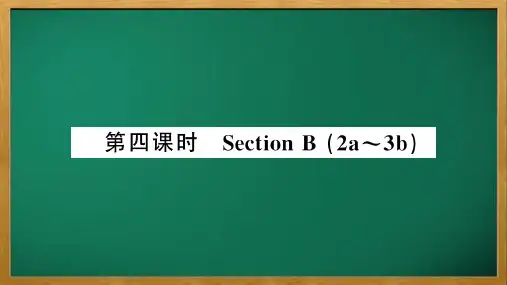
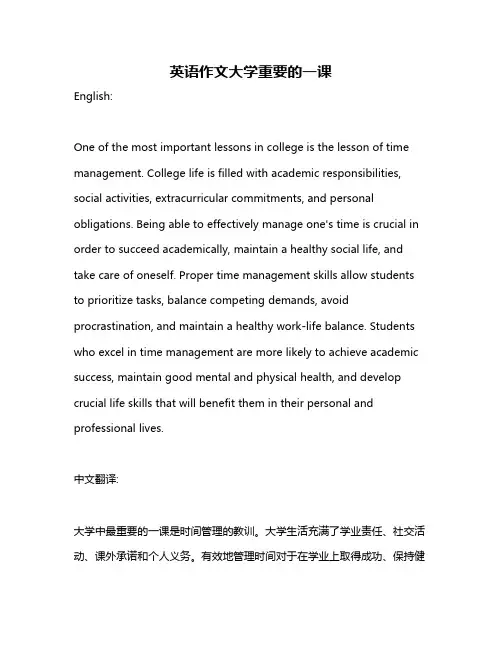
英语作文大学重要的一课English:One of the most important lessons in college is the lesson of time management. College life is filled with academic responsibilities, social activities, extracurricular commitments, and personal obligations. Being able to effectively manage one's time is crucial in order to succeed academically, maintain a healthy social life, and take care of oneself. Proper time management skills allow students to prioritize tasks, balance competing demands, avoid procrastination, and maintain a healthy work-life balance. Students who excel in time management are more likely to achieve academic success, maintain good mental and physical health, and develop crucial life skills that will benefit them in their personal and professional lives.中文翻译:大学中最重要的一课是时间管理的教训。
大学生活充满了学业责任、社交活动、课外承诺和个人义务。
有效地管理时间对于在学业上取得成功、保持健康的社交生活和照顾自己至关重要。
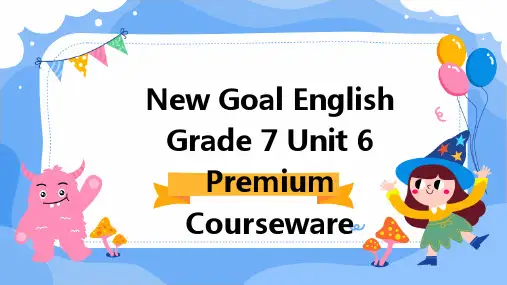
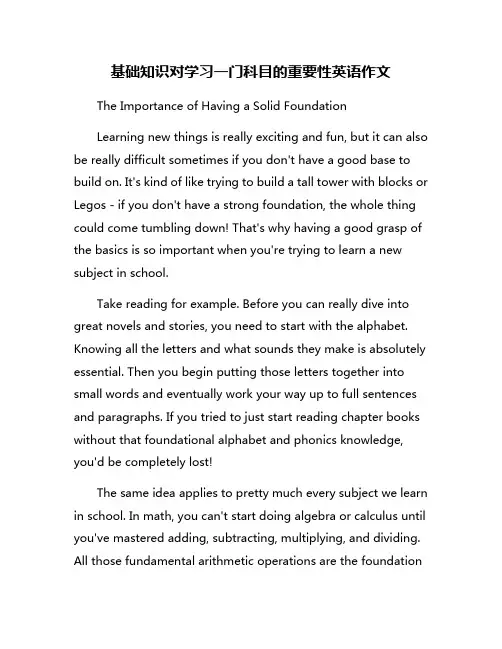
基础知识对学习一门科目的重要性英语作文The Importance of Having a Solid FoundationLearning new things is really exciting and fun, but it can also be really difficult sometimes if you don't have a good base to build on. It's kind of like trying to build a tall tower with blocks or Legos - if you don't have a strong foundation, the whole thing could come tumbling down! That's why having a good grasp of the basics is so important when you're trying to learn a new subject in school.Take reading for example. Before you can really dive into great novels and stories, you need to start with the alphabet. Knowing all the letters and what sounds they make is absolutely essential. Then you begin putting those letters together into small words and eventually work your way up to full sentences and paragraphs. If you tried to just start reading chapter books without that foundational alphabet and phonics knowledge, you'd be completely lost!The same idea applies to pretty much every subject we learn in school. In math, you can't start doing algebra or calculus until you've mastered adding, subtracting, multiplying, and dividing. All those fundamental arithmetic operations are the foundationthat more advanced math is built upon. If your basics aren't solid, solving complex equations will be an uphill battle.Science has building blocks too. Before studying biology, chemistry, physics and other specific sciences, you need to understand the core scientific method. How do you form a hypothesis? How do you design and carry out an experiment? How do you analyze the data and draw conclusions? Those procedural basics let you properly investigate and understand scientific phenomena when you move into specialized fields.Even subjects like history and social studies require foundational understanding. You can't fully comprehend events, social movements, or public policies without first having a grasp of basic concepts like nations, governments, economies, cultures and so on. The histories of ancient civilizations or modern social issues won't make much sense until you establish that essential working knowledge first.The point is, no matter what you're trying to learn, there is an important hierarchy to follow. You need to start with understanding the core components and fundamentals. Those basics then allow you to steadily progress into more complex, advanced concepts and applications within that subject area.Skipping the foundations is like trying to run before you can walk - you'll likely stumble and struggle.I know sometimes the basics can seem boring or overly simple. When I was first learning to read, I remember being so eager to dive into longer books with chapters and more interesting stories. Having to slowly plod through short sentences with basic vocabulary felt tedious and restrictive at the time. But my teacher explained that I had to go through those steppingstones first before I'd be ready for more engaging reading material. Looking back now, I realize she was completely right.In math class, I'd feel impatient having to do hundreds of straightforward addition and subtraction problems repeatedly when part of me wanted to get to the "real" math. My parents would say "Trust us, you need to know this basic stuff like the back of your hand first." As always, mom and dad were wise! Those fundamentals turned out to be critically important as I moved into more advanced math applications.The same goes for any subject, hobby, or skill you want to pick up. Want to learn an instrument? You have to start by understanding how to read music notation and properlyhold/operate the instrument. Want to learn to code? Beforewriting complex programs, you'll need to learn basic programming syntax and logic. Want to be an artist? You'll first work on drawing and shading techniques before creating masterpieces. Every area of study has core foundations you must grasp before the deeper, more comprehensive learning can occur.So although the fundamentals may not seem particularly interesting at first, try to have patience and appreciate how important they truly are. Think of it like building a strong house - if you don't put in the time and effort to create a solid foundation, the whole structure could crumble. With a firm base of knowledge in place however, your learning can steadily expand and progress to incredible heights over time. Stay focused on mastering those basics first, and the more exciting, advanced learning opportunities will follow. Embrace and value that critical foundational stage, because it paves the way for all your future growth and understanding!。
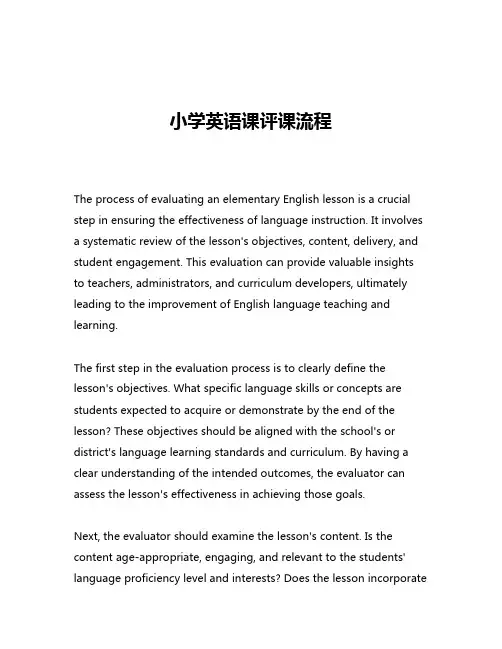
小学英语课评课流程The process of evaluating an elementary English lesson is a crucial step in ensuring the effectiveness of language instruction. It involves a systematic review of the lesson's objectives, content, delivery, and student engagement. This evaluation can provide valuable insights to teachers, administrators, and curriculum developers, ultimately leading to the improvement of English language teaching and learning.The first step in the evaluation process is to clearly define the lesson's objectives. What specific language skills or concepts are students expected to acquire or demonstrate by the end of the lesson? These objectives should be aligned with the school's or district's language learning standards and curriculum. By having a clear understanding of the intended outcomes, the evaluator can assess the lesson's effectiveness in achieving those goals.Next, the evaluator should examine the lesson's content. Is the content age-appropriate, engaging, and relevant to the students' language proficiency level and interests? Does the lesson incorporatea variety of language-learning activities, such as listening, speaking, reading, and writing tasks? Are the materials and resources used in the lesson of high quality and support the learning objectives? The evaluator should also consider the balance between explicit instruction and opportunities for students to practice and apply their language skills.The delivery of the lesson is another crucial aspect to be evaluated. How effectively does the teacher manage the classroom and maintain student engagement? Does the teacher use a variety of instructional strategies, such as modeling, scaffolding, and differentiation, to cater to the diverse learning needs of the students? Is the teacher's use of the target language appropriate, and do they provide ample opportunities for students to use the language actively? The evaluator should also observe the teacher's ability to provide clear instructions, check for student understanding, and provide timely feedback.Student engagement is a critical component of a successful English lesson. The evaluator should observe the level of student participation, interest, and motivation throughout the lesson. Are students actively involved in the learning activities, or do they appear disengaged? Do students demonstrate a willingness to take risks and use the target language, even if they make mistakes? The evaluator should also consider the classroom environment and how it supportsor hinders student engagement.Finally, the evaluator should consider the overall effectiveness of the lesson in achieving its stated objectives. Did the students demonstrate the intended language skills or knowledge by the end of the lesson? What evidence is there of student learning, such as formative assessments or work samples? The evaluator should also consider the lesson's alignment with the school's or district's language learning goals and the broader curriculum.Throughout the evaluation process, the evaluator should maintain an objective and constructive approach. The goal is not to criticize the teacher, but to provide meaningful feedback that can help improve the quality of English language instruction. The evaluator should engage in a collaborative dialogue with the teacher, discussing the strengths of the lesson, areas for improvement, and strategies for professional development.In conclusion, the process of evaluating an elementary English lesson is a comprehensive and multifaceted endeavor. By carefully examining the lesson's objectives, content, delivery, and student engagement, evaluators can provide valuable insights that can lead to the enhancement of English language teaching and learning. This evaluation process is essential for ensuring that students receivehigh-quality instruction and have the best possible opportunities to develop their language skills.。
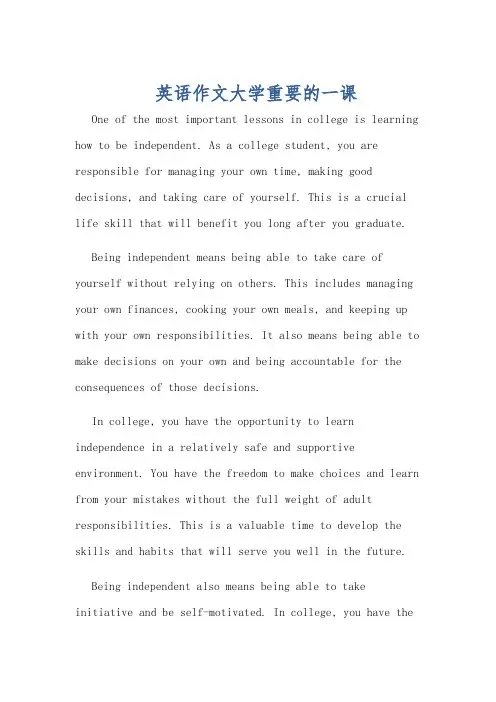
英语作文大学重要的一课One of the most important lessons in college is learning how to be independent. As a college student, you are responsible for managing your own time, making good decisions, and taking care of yourself. This is a crucial life skill that will benefit you long after you graduate.Being independent means being able to take care of yourself without relying on others. This includes managing your own finances, cooking your own meals, and keeping up with your own responsibilities. It also means being able to make decisions on your own and being accountable for the consequences of those decisions.In college, you have the opportunity to learn independence in a relatively safe and supportive environment. You have the freedom to make choices and learn from your mistakes without the full weight of adult responsibilities. This is a valuable time to develop the skills and habits that will serve you well in the future.Being independent also means being able to takeinitiative and be self-motivated. In college, you have theopportunity to pursue your own interests, participate in extracurricular activities, and take on leadership roles. These experiences can help you develop a sense of purpose and direction in your life.In addition, learning to be independent in college can also help you develop important life skills such as time management, problem-solving, and resilience. These skills are essential for success in both your personal and professional life.Overall, the lesson of independence is a vital part ofthe college experience. It teaches you how to take care of yourself, make good decisions, and navigate the challengesof adulthood. It is a lesson that will serve you well throughout your life.在大学里,学会独立是最重要的一课之一。
英语初中作文如何讲课How to Give a Lesson。
Giving a lesson is an important skill that all teachers need to develop. Whether you are teaching a small group of students or a large class, the way you deliver the lesson can have a big impact on how well your students learn and retain the information. Here are some tips for giving a successful lesson.First of all, it's important to be prepared. This means knowing the material you are going to teach inside and out, and having a clear plan for how you are going to present it. It's also a good idea to have any materials or resourcesyou will need for the lesson organized and ready to go.When you are giving a lesson, it's important to engage your students and keep them interested. One way to do thisis by using a variety of teaching methods. For example, you might start the lesson with a short lecture, then move onto a group activity or discussion, and finish with a hands-on demonstration or experiment. This helps keep the lesson dynamic and prevents students from getting bored.Another important aspect of giving a lesson is to make sure that you are clear and concise in your explanations. Avoid using too much jargon or technical language, and try to break down complex ideas into simpler, more understandable terms. It's also important to check in with your students regularly to make sure they are following along and understanding the material.Finally, it's important to be flexible when giving a lesson. Sometimes, things don't go as planned, and it's important to be able to adapt on the fly. This might mean changing the order of your lesson, taking extra time to explain a difficult concept, or finding a new way to engage a student who is struggling to keep up.In conclusion, giving a successful lesson requires careful preparation, engaging teaching methods, clear communication, and flexibility. By keeping these tips inmind, you can ensure that your students get the most out of your lessons and are able to retain the information you are teaching them.。
课程要素英语作文An English essay is a structured piece of writing that requires a critical understanding of the subject matter. Here are the essential elements that every English essay should include:1. Introduction: This is the opening paragraph of your essay. It should introduce the topic, provide any necessary background information, and end with a clear thesis statement that outlines the main argument or point of the essay.2. Body Paragraphs: These are the main sections of your essay where you present your arguments. Each paragraph should focus on one main idea that supports your thesis. Start with atopic sentence, followed by evidence (such as facts, statistics, or quotes), and then an explanation of how this evidence supports your point.3. Counterarguments: It's important to acknowledge opposing viewpoints and to address them within your essay. This shows that you've considered different perspectives and strengthens your own argument.4. Conclusion: The conclusion should summarize the main points of your essay and restate your thesis in a new way.It's not just a rehash of what you've already said, but a final chance to leave a lasting impression on your reader.5. Coherence and Cohesion: Your essay should flow logically from one point to the next. Use transitional phrases to connect your ideas and maintain a clear and coherent structure.6. Grammar and Syntax: Proper use of English grammar and sentence structure is crucial. Errors can distract from your argument and make your essay harder to understand.7. Vocabulary: Use a range of vocabulary to express your ideas precisely and effectively. Avoid repetition and strive for clarity.8. Citation and Referencing: Always give credit to the sources you use for your research. This not only avoids plagiarism but also adds credibility to your essay.9. Proofreading: Before submitting your essay, proofread it carefully to correct any spelling, grammatical, or punctuation errors. It's also a good opportunity to check for clarity and coherence.10. Formatting and Presentation: Follow any specific formatting guidelines provided by your instructor or institution, such as font size, margins, and citation style.By focusing on these elements, you can craft an effective English essay that is both persuasive and academically rigorous.。
Lesson: What is Important?
课程名:什么是重要的?
Sunday 11:30
时间:星期天11:30
Teachers: Karen, Russ
授课教师:Karen, Russ
Materials: White board (or something to write on)
教学用具:白板(或者其它可以在上面书写的物品)
“Hi kids. Are you having fun? … Learning new things? … Through activities and discussions, you’ve had opportunity to think about many things. Let me ask you: what do you think is very important?”“同学们,你们玩儿得开心么?有没有一些收获?通过这些活动和讨论,你们应该思考了很
多事情,现在我来问问你们:什么是你们认为最重要的?”
-Call on someone for an answer, and invite them or others to expand on that thought (e.g., “Why is … important?”). Repeat for more answers. Write answers on whiteboard in Chinese.
-请一位学生来回答,然后让他们或者其他的同学来就着这个想法进行补充提问(比如说,为什么你认为……很重要)。
多问几个学生让他们说出各自不同的答案。
将他们的答案用中文写在白板上。
o I am important
o我自己就很重要
o My family is important
o我的家庭很重要
o My neighbor is important
o我的邻居很重要
o Therefore, how I treat others is important
o因此,我们如何对待他人(与人相处)很重要
▪kind, considerate, appreciative, cooperative, forgiving
▪亲切,体贴,感激,合作,宽恕
o My thoughts are important. Therefore, what I choose to think about is important
o我自己的想法很重要,因此,我选择去思考的事物是重要的
▪My thoughts are the MOST important thing in determining the course of my life—whether I will be good or bad, successful or a failure
▪我的思想是决定我的生活的最重要的原因——无论我会因此变好或变坏,成功或失败
▪What others think is also important
▪他人的想法也很重要
o My choices are important
o我自己的选择很重要
▪They impact others for good or ill
▪它们会影响其它事物的好坏
▪Ask: “What are some acts of kindness you can choose to do?” Help with chores at home (make snacks, wash dishes…), words of encouragement or thanks....
▪提问:“你能够去做哪些善举?”帮忙做家务(像是做点小吃,洗洗
碗……),一些鼓励或者感谢的话语……
o Being imaginative and creative are important
o富有想象力和创造力很重要
o Learning is important
o学习很重要
▪To become more wise, imaginative and creative
▪变得更有智慧,更有想象力和创造力
Activity: What I Think is Important
活动:我认为重要的事物
Format: Small group discussion
形式:小组讨论
Materials: White boards (or something to write on)
教学用具:白板(或者其它可以在上面书写的物品)
“Why are what you think about and how you think about it important?
为什么你对于事物的想法和你看待它们方式很重要呢?
What I think about determines my choices. True and good thoughts lead to wise and good choices. False and bad thoughts lead to foolish and bad choices.
我的想法决定了我的选择。
真实的、正确的想法能够让我做出明智的、正确的选择。
Good, wise choices lead to wisdom and success, to a happy, healthy life.
正确的、明智的选择带来的是智慧和成功,带来的是一个幸福健康的生活。
Bad, foolish choices lead to foolishness and failure.
错误的、愚蠢的选择带来的则是愚蠢和失败。
How I think about something [mentally process it] is also important because that controls my feelings. “For example, suppose you are unexpectedly called to the Principal's office. Your mind evaluates the information and tells your emotions –‘You are in trouble now.’ Instantly, the butterflies in your stomach start, your legs move slower and fear wells up in your heart. When you get to the principal's office you find out he just wanted to thank you for some kind deed you did.”“What happened?” Your mind fed your emotions FALSE information and your emotions simply reacted.
我对事物的看法(潜意识的过程、心理暗示)也很重要,因为这决定了我的感受。
“打个比方,假如你意外地被叫到了校长办公室,你内心一定会有一些暗示——‘你一定惹麻烦了’,
并且这还会影响到你的情绪。
马上,蝴蝶效应可能从你的肚子开始,你的步伐变慢,心跳加速。
然而当你到了校长办公室后,你发现他只是因为你的善举想向你表示感谢。
”
“发生了什么?”你的思维将错误的暗示传递给你的情绪,然后你的情绪直接表现出了相应的反应。
“What are some choices you can make to help you think true and good thoughts instead of false and bad thoughts?”
“你做的哪些选择能够帮助你进行真实的、正确的而不是错误的、失败的思考呢?”
-The kind of TV I watch
-我看的电视的种类
-The kink of music I listen to
-我听的音乐的种类
-The kind of friends I choose
-我交往的朋友的类型
-What I choose to believe
-我选择相信的事物
o If I hope to become a doctor and someone tells me I not smart enough, I can refuse to believe that and follow my dream.
o如果我想成为一名医生但是有人说我不聪明,我不会相信他说的而会去继续追逐我的梦想。